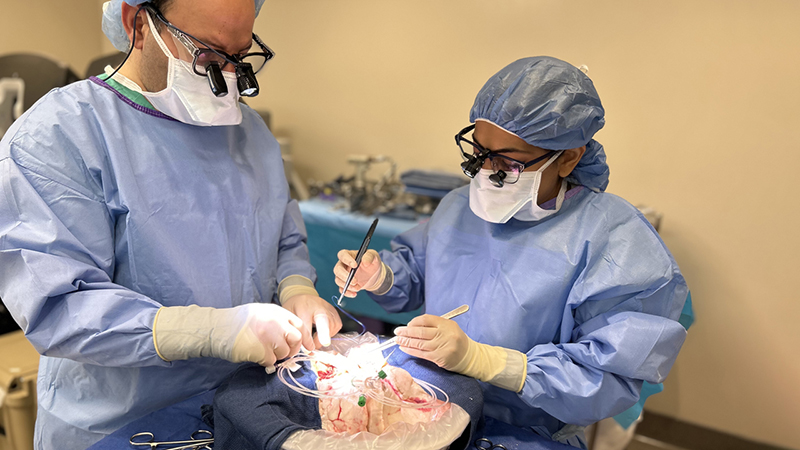Why Genetic Counseling Matters
Published April 2019
Medical Guidance Key to Understanding Results
Thanks to the internet, you can order at-home genetic tests with the click of button. But once you get your results, how do you know what they mean? Instead of picking up an off-the-shelf kit, you could also pursue testing through a genetic counselor, who can discuss your unique results in light of your personal and family medical history.
Regardless of which path you choose, it’s important to understand what these tests can be used for and what the results may mean.
What Genetic Testing Is Used For
Genetic testing is the process of assessing your risk factors for genetic conditions and can provide insight into a variety of conditions and related concerns, such as:
- Alzheimer’s disease and dementia
- Amyotrophic lateral sclerosis (ALS) or Lou Gehrig's disease
- Cancer
- Epilepsy
- Huntington’s disease
- Parkinson’s disease
- Reproductive genetics
If you meet with a genetic counselor, you’ll have the opportunity to discuss your family history and receive personalized baseline risk information. This can help guide testing decisions, including an explanation of what can be tested for and why. A genetic counselor can also provide information to help you learn about the causes of an inherited disorder.
DNA can be obtained through either blood or saliva. Once your DNA samples are submitted, depending on the test, you may have to wait two to 12 weeks to receive the results. When samples are submitted to a HIPAA-compliant and CLIA-certified laboratory, testing is focused on a specific group of genes. You can choose to have the laboratory keep the sample on file for further testing in the future or destroy it. Either way, your safety and privacy are protected by law.
If results come in the mail, you may be unsure what next steps to take or what they mean for you personally. On the other hand, testing through a genetic counselor gives you access to medical and ethical advice and support when results arrive. “I like to have people come in for results. The face-to-face is important when you’re getting important information like this. Even if it’s negative, we’ll discuss what this means,” says Lisa M. Kinsley, MS, CGC, senior neurogenetic counselor in the Northwestern Medicine Movement Disorders Neurogenetics Clinic at Northwestern Memorial Hospital.
Who Might Consider Genetic Testing
In general, you might consider genetic testing if you:
- Are experiencing symptoms of a condition at a younger age than is typical
- Have a family history of a particular disease
- Have a family history of related diseases
For example, 5 to 10 percent of cancers are hereditary, or caused by genetic mutations passed down by family. And while genetic mutations increase your risk for developing certain cancers, not everyone with the mutation will develop cancer. Genetic counseling can help you better understand your risk and develop a plan for appropriate screening.
Similarly, genetic testing can shed light on certain neurological conditions such as Alzheimer’s disease and dementia. “Genetic testing can help inform us,” says Kinsley. “It’s helpful to talk about why symptoms may be occurring and what research might be available. We have more of a discussion about inheriting these genes.”
For many adult-onset progressive conditions like dementia, you should be at least 18 years old to have genetic testing, unless there is the possibility of exhibiting symptoms at an earlier age, or there are treatment or surveillance options to consider. However, many people seek genetic testing in their 30s and beyond, and it’s common to have testing done to better understand the risk of passing certain genes on to children, explains Kinsley. “It gives back a sense of control that it won’t affect a person’s children,” she says.
Elizabeth E. Gerard, MD, an epileptologist at Northwestern Medicine Comprehensive Epilepsy Center, uses genetic testing for adult patients with epilepsy. “Clinical genetic testing for children with epilepsy has been a staple in the pediatric epilepsy clinic for a long time, and up to 30 percent of severe pediatric epilepsy syndromes have an identifiable genetic cause,” says Dr. Gerard. “At Northwestern medicine we are opening a specialized interdisciplinary genetic clinic for adults with epilepsy, which will allow us to offer clinical genetic counseling and testing to adults with epilepsy that may have a genetic cause.”
Change Your Future – and the Future of Medicine
Thanks to medical advances, early detection may open doors for new treatment opportunities. And for some conditions, a genetic diagnosis may be required in order to be eligible for a particular treatment. A genetic diagnosis may also make you eligible for certain clinical trials, which can give you access to additional treatment options and offer the opportunity to help advance research into your condition.
“Our understanding of the genetic causes of epilepsy has increased tremendously in the past decade,” notes Dr. Gerard. “Uncovering the genetic changes in patients with epilepsy can help us better understand what causes epilepsy and help us develop new treatments.”
Additionally, through the Movement Disorders Neurogenetics Clinic you may be able to submit your DNA to active research. “Breakthroughs in one area can lead to a breakthrough in another. We can give a diagnosis, and be very specific with the genetic cause, but it’s not always something we can act on,” says Kinsley. “By submitting for research, you’re helping find a cure and change the future.”
So whether you’re planning a family or looking to take a proactive approach to future healthcare plans, see if genetic testing is right for you. Learn more.
Interested in other ways to help advance the future of medicine? Learn about the All of Us Research Program.







